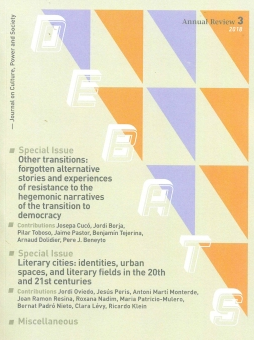Transitions, illusions, frustrations, and hopes
Resum
Francoism was a brutal dictatorship, but it was not always that way. During the 1940s and 1950s, people in Spain lived under a dictatorship like that of other fascist dictatorships, in a civil war atmosphere of repression and terror. Society lived in fear and/or submission; resistant minorities were heroic, but they did not change the political regime. In the 1970s, some segments of society gradually began to lose their fear; the Spanish state no longer controlled social or daily life regarding the use of language; the fight of the trade unions grew despite State repression; universities and cultural spheres despised Francoism and, by the end of the decade, social demands and protests emerged in working-class neighbourhoods. In this context, the political cores—most of the left as well as nationalists—began to take root in the most critical areas of the regime and an ‘agreed transition’ became almost inevitable. Most of society did not want the Franco regime to continue, but they also feared a traumatic and violent change. The result was a formal democratic beginning. However, institutional Francoism was still present, for example, in the armed forces, the upper echelons of bureaucracy, and the Judiciary. Transition was the beginning of democratisationDescàrregues
Descàrregues
Publicades
Com citar
Número
Secció
Llicència
Sense perjudici del que disposa l'article 52 de la Llei 22/1987 d'11 de novembre de Propietat Intel·lectual, BOE del 17 de novembre de 1987, i conforme a aquest, els/les autors o autores cedeix/en a títol gratuït els seus drets d'edició, publicació, distribució i venda sobre l'article, per tal que siga publicat a Debats. Revista sobre cultura, poder i societat.
Debats. Revista de cultura, poder i societat es publica sota el sistema de llicències Creative Commons segons la modalitat “Reconeixement – NoComercial (by-nc): Es permet la generació d’obres derivades sempre que no se’n faça un ús comercial. Tampoc no es pot fer servir l’obra original amb finalitats comercials”.
Així, quan l’autor/a envia la seva col·laboració, accepta explícitament aquesta cessió de drets d’edició i de publicació. Igualment autoritza Debats. Revista de cultura, poder i societat la inclusió del seu treball en un fascicle de la revista perquè es puga distribuir i vendre.











